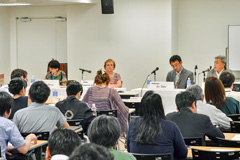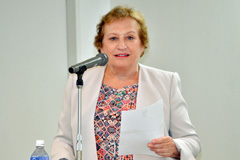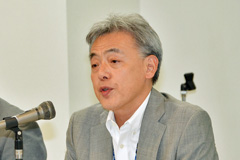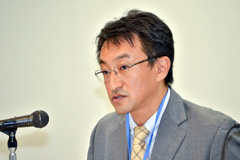Seminar Looks at the Role of DAC and What Japan Can Do at the New Development Cooperation Stage
2019.10.09
A seminar hosted by the JICA Research Institute (JICA-RI), titled “The Role of the OECD DAC and the Expectations of Japan’s Involvement in the Changing Global Development Cooperation Architecture,” took place at JICA-RI on Sept. 2, 2019.

Participants discussed a wide range of issues, prompting questions from the floor
The keynote speaker was Susanna Moorehead, chair of the Organisation for Economic Cooperation and Development (OECD) Development Assistance Committee (DAC), and the commentators were Mutsuya Mori, vice president of the Japan International Cooperation Agency (JICA), and Jin Sato, visiting fellow at JICA-RI as well as professor at the Institute for Advanced Studies on Asia, the University of Tokyo. With Izumi Ohno, director of JICA-RI serving as moderator, the seminar discussion focused on topics such as mobilizing private sector financing for development cooperation, working in concert with emerging donors and achieving Sustainable Development Goals (SDGs) amidst changes to the global development cooperation landscape.
During the keynote speech, Moorehead said that SDGs reflect the increased complexity of development challenges compared to the Millennium Development Goals (MDGs), and there are new challenges overlaid on old ones. In particular, she described climate change and demographic explosion in Africa along with the accompanying issue of job creation as challenges to be addressed. She said one of her top priorities is to make sure that DAC is dynamic, flexible, adaptable and innovative in order to confront these challenges. Moreover, she mentioned that DAC was set up as a committee to hold each other to account to ensure that aid recipient countries are the ones that benefit from ODA. The DAC therefore collects and analyses data, issues guidelines on the management of development assistance, and creates consensus among DAC member nations. She also stressed the importance of the DAC’s role in upholding democracy, transparency and accountability as common values.

Susanna Moorehead, chair of OECD/DAC delivered the keynote speech
According to Moorehead, the mobilization of funds for achieving SDGs is one of the biggest challenges faced by the DAC. She said we need to mobilize financial resources from the private sector in developed countries, and to achieve that, innovative methods are required, while in developing countries, we must work to increase tax revenue and ensure debt sustainability. She also raised the importance of collaboration with emerging donors, such as China, saying that it’s critically important to engage with China because it is playing such an important role in countries where Japan and other donors aren’t investing and that it is important to establish prompt communication with China so that we could share our common values and aims.
Moorehead said that in the past, Japan was criticized for focusing on infrastructure assistance and economic development, while other DAC members worked mainly on technical cooperation. However, taking into account Asian success in poverty reduction on an unprecedented scale, Japan’s experience is of enormous interest to other DAC donors for its contributions to sustainable growth through job creation, expansion of the middle class and cultivation of human resources. She also noted that Japan’s significant contributions in the area of disaster prevention/reduction also deserve attention, adding that such technical cooperation is as important as infrastructure projects. Furthermore, Moorehead said that Japan is expected to play a leading part in development discussions by using its advanced ideas for working with the private sector for development cooperation, that Japan is a pioneer in triangular cooperation, and that going forward, Japan should share the enormous lessons that Asia has for the rest of the world.
The keynote speech was followed by comments by Mori regarding the field of finance.
He said that since ODA alone cannot fill the enormous funding gap in developing countries, we need innovative methods of raising funds from the private sector, and that DAC has an important role in achieving that. With regard to the mobilization of funds, he explained that there were two approaches to consider: redirecting funds from developed countries to developing countries, and effective utilization of funds originating within developing countries.

Mutsuya Mori, vice president of JICA made comments on finance
He said that with regard to the former approach, the Asian ESG (environmental, social, and governance) investment market is still small-scale, and going forward, we need to apply knowledge from the EU and the US, where the ESG market is more active. With regard to the latter approach, he pointed out the need to cooperate with domestic development banks in developing countries to seek measures for mobilizing funds that originate within those developing countries into SDG-related investments.
Next was Sato, who proposed “integration” and “diversity” as keywords related to development cooperation. He went on to say that the DAC’s pursuit of “integration” on the Western side of things through standards and statistics had produced moderate results, but he questioned whether integrating emerging donors into the international framework presented by the DAC would always be beneficial from the viewpoint of the recipient countries. He said that the donors were a diverse group, and that having donors each offer their own proposals for assistance would increase the bargaining power of recipient countries, which may be considered preferable from the recipient country’s point of view. Sato said that, putting it simply for the sake of discussion, we should appreciate that diversity in development cooperation might work to the advantage of the recipient country. Additionally, such diversity could lead to more diverse ideas about what development is, and it can generate new perspectives on how to tackle development issues.

Jin Sato, visiting fellow at JICA-RI proposed “integration” and “diversity” as keywords related to development cooperation
During the question-and-answer session, a wide range of issues were raised regarding the possibility of China joining the DAC, on how to effectively communicate with China, and on the relationship between the DAC and the United Nations, and a meaningful discussion developed.
Lastly, Ohno concluded the seminar by saying that diversity is important because recipient countries need to have options, from government policy to procedures, in order to choose what is suitable for them.

事業事前評価表(地球規模課題対応国際科学技術協力(SATREPS)).国際協力機構 地球環境部 . 防災第一チーム. 1.案件名.国 名: フィリピン共和国.

事業事前評価表(地球規模課題対応国際科学技術協力(SATREPS)).国際協力機構 地球環境部 . 防災第一チーム. 1.案件名.国 名: フィリピン共和国.

事業事前評価表(地球規模課題対応国際科学技術協力(SATREPS)).国際協力機構 地球環境部 . 防災第一チーム. 1.案件名.国 名: フィリピン共和国.

事業事前評価表(地球規模課題対応国際科学技術協力(SATREPS)).国際協力機構 地球環境部 . 防災第一チーム. 1.案件名.国 名: フィリピン共和国.

事業事前評価表(地球規模課題対応国際科学技術協力(SATREPS)).国際協力機構 地球環境部 . 防災第一チーム. 1.案件名.国 名: フィリピン共和国.
scroll